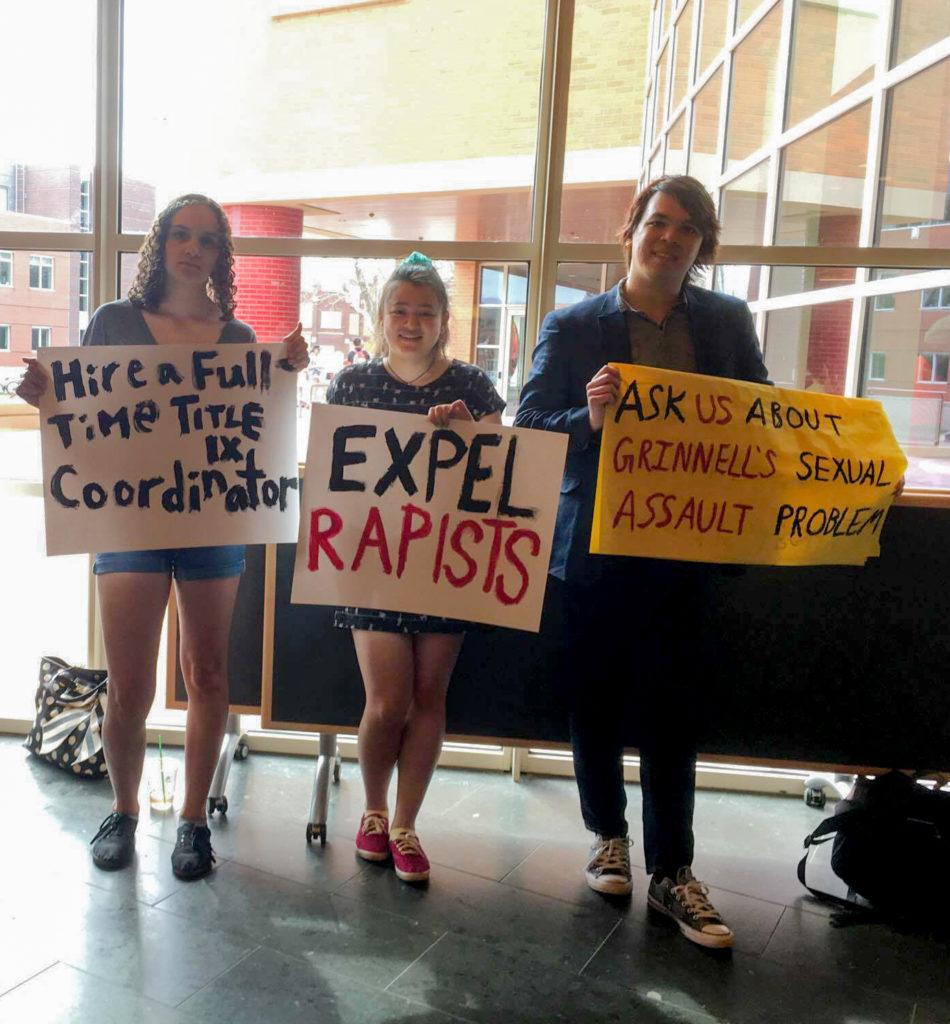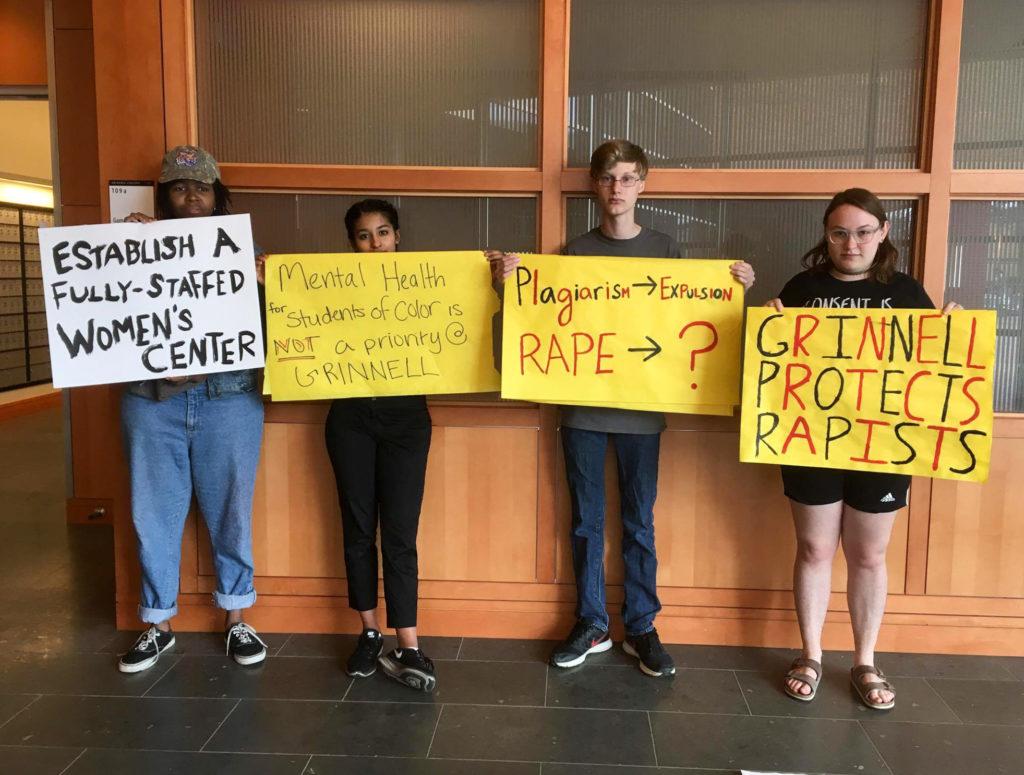 Three student groups united to protest at an admitted students event in an attempt to get the attention of the administration. Contributed photo.
Three student groups united to protest at an admitted students event in an attempt to get the attention of the administration. Contributed photo.
This Sunday, April 9, as prospective students entered the JRC, they were greeted by more than just name-tags and free coffee at the Welcome desk. Right across from the Laurel Leaf Lounge stood students holding bright yellow signs which read “Plagiarism = Expulsion, Rape = ?” and “Grinnell College doesn’t care about mental health for students of color.” The protest was the product of a coalition between the groups Dissenting Voices, Occupy 8th and Grinnell College Student Action (GCSA), who all wanted to gain the attention of the administration, which they say has been unresponsive to the concerns of students and even to their legal obligations.
The location and time of the protest was meant to be provocative, as it was close and visible to prospective students, a group which the administration cares deeply about.
“It actually came from an idea from my mom,” said Leah Barr ’18, a member of Dissenting Voices. “I was talking with her about … the sexual assault problem at Grinnell, and I was wondering what ways would hit the hardest, and she said ‘what would affect the trustees the most?’ Together we talked about how enrollment was something that could bring more attention to the issue.”
“One of the reasons why we wanted to hold an event that would capture the attention of the trustees is that in the past we have met with the administration with our aims and goals, and it doesn’t seem to go far. So we wanted to think of a different approach that would push this issue further,” Hanky Song ’17, another member of the organization, added.
The coalition wanted the protest to be a surprise, lest the administration made moves to dampen its effect. Indeed, Sarah Fischer, Director of Admissions, said she was a little startled at first about the student’s actions, but then decided to go over with some colleagues and speak with the protestors.
“We wanted to know more about their side of the story,” Fischer said. “I’m relatively new to the Grinnell community, so it was interesting to me to learn about what their needs are and … where [they believe] the administration has to do a better job in addressing these issues.”
As the group was a coalition of three different organizations, these issues originated from a wide-range of recent student activism. Dissenting Voices used the platform to argue for three of their most important policy goals: minimum sentences for student rapists, the hiring of an independent, full-time Title IX coordinator and the establishment of a fully-staffed women’s center.
“It’s basically a call for a minimum outcome,” Halley Freger ’17 said. “When someone is found responsible for nonconsensual intercourse, for that act, the minimum outcome should be defined as expulsion.”
As 90 percent of campus rapes are committed by repeat offenders, Dissenting Voices sees the establishment of this minimum outcome as not only a justice issue, but one of safety as well. They say that allowing rapists to stay on campus not only re-traumatizes the victim, but makes the threat of sexual violence all the more real for people at Grinnell.
“Another positive change that [might result] from this change would be that rapists would understand that there are concrete consequences to their actions, and hopefully this would deter sexual violence from happening,” Song said.
Additionally, the group wants to make some structural changes in the way that the Title IX department is organized. As of now, Angela Voos, who is the Title IX coordinator, is also the Vice President for Strategic Planning, two positions that Dissenting Voices say are in direct contradiction with each other.
“You have to follow the money,” Barr said. “It makes financial sense for the Title IX coordinator to be wrapped up in the president’s office because part of the president’s job is fundraising and image control. So if you have full control over which rape cases become publicly known … the image is protected.”
“And this is where the conflict of interest comes in … right now she is simultaneously doing VP of strategic planning, which is all about the image,” Song added.
Furthermore, the group wants the College to establish a women’s center, as many peer institutions have done, which they say could be a place where more discussions and organizing around gender-based issues could occur.
Besides Dissenting Voices, Occupy 8th and GCSA also were part of the protest, and they too presented demands to the administration. GCSA is the student group responsible for the recent ‘Divest Grinnell’ movement that has gained a following amongst both students and alumni. To promote this goal, the group advocated for a promise from Grinnell that they would sell off their 100 million dollars worth of investments in the fossil fuel industry.
Occupy 8th is a relatively new group comprised of three women of color who collaborate with other student organizations to promote the recognition of the important role women of color play in progressive movements, as well as to advocate for changes that focus on supporting racial diversity. For this event, they pressed the administration to conduct a national search to hire culturally-competent therapists at SHACS.
“This goal isn’t something that maybe we were thinking about in our own meetings, but it definitely falls under the branch of things we are establishing our group to be. So, I think for us, we want to work more and push this issue further,” said Hazel Batrezchavez ‘17, a member of Occupy 8th.
As for the prospective students themselves, tour guides say that they seemed to be both interested in, but also a little apprehensive of, the protest. Admissions told tour guides to address the protest, but to also place it within the frame of a history of activism at Grinnell.
“One thing they made clear is that we should talk about it actually, because you don’t just let something like that sit,” Anna Schierenbeck ‘18, a tour guide, said. “So they told us to talk about the history of protest at Grinnell and to acknowledge that the administration was letting them stay there, instead of at other schools where they would be pushed out, which is an interesting approach … and they said to be honest, they said ‘don’t lie about sexual assault at Grinnell.’”
And while there was some talk amongst the current student body that this protest was to warn prospective students away from Grinnell, the organizers say that was not their intention.
“The goal of the protest is not to discourage students from coming here, these [written demands] are the goals … this is the goal, and any sort of symbolic gesture that is needed to accomplish these goals is worth it,” Freger said.






































































Nick Lloyd '04 • Apr 17, 2017 at 9:09 am
What a powerful way for a few people, some poster board and some markers to make a resounding statement. Great work